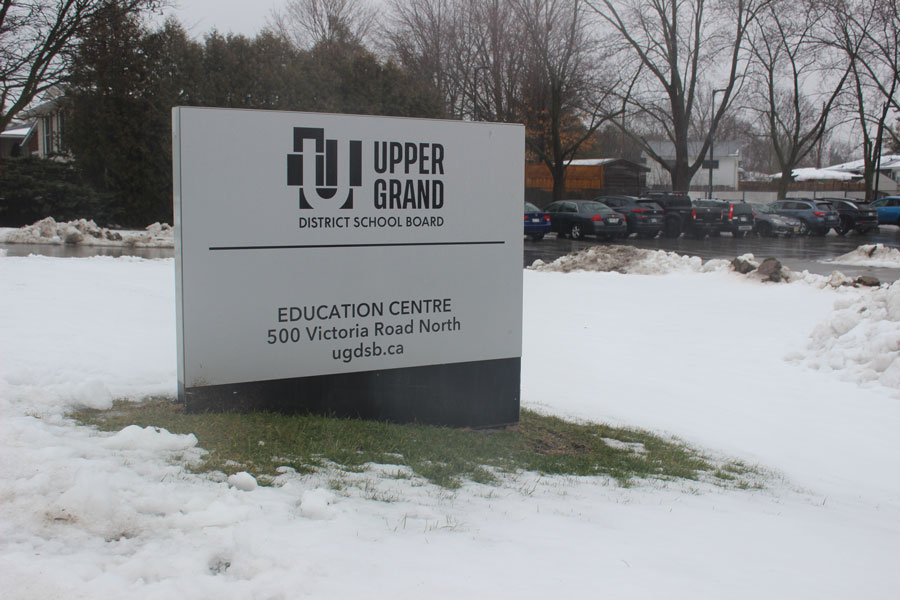GUELPH – During the Upper Grand District School Board (UGDSB) meeting on Feb. 27, trustees approved updates to five policies.
These policies pertain to:
– community use of schools;
– communications;
– safe operation of school and board sites;
– continuity of learning; and
– school-generated funds.
Community use of schools
The policy about community use of schools and facilities was out for public consultation between Oct. 25 and Dec. 8, and the board received 11 comments from community users and staff, states a report from the board’s policies and priorities committee.
Many of the responses sought clarification on rules around community use of schools.
“A few respondents mentioned situations where behaviors during a community use of schools event were concerning,” the report continues, so the following sentence was added to the policy:
“It is the responsibility of all members of a school community including … community users to do their part in ensuring positive interactions and respectful relationships while on UGDSB property.”
Specific rules are outlined in the community use of schools handbook, which can be found at ugdsb.ca/community/community-use-of-school-facilities/.
This handbook will be updated to reflect the policy updates.
Trustee Jen Edwards said a parent asked her for clarification about community use of schools during summer months, which is not outlined in the policy.
Director Peter Sovran said summer availability varies from one school to the next.
The updated policy outlines how schools submit their own facility requirements in advance of each new school year.
School and board-related use of facilities takes precedent over community use, and community use of schools primarily occurs after regular school hours.
Communications
The communications policy is a new policy that will replace two existing policies regarding:
– distribution of materials in schools from external organizations; and
– website and social media management.
It also incorporates the board’s brand identity and crisis communications protocol.
The communications policy was out for public consultation from Nov. 29 to Jan. 12 and five comments were received.
“None of the comments warranted any changes to the policy,” states a report from the policy and priorities committee.
Safe operation of school and board sites
A new policy about the safe operation of school and board sites was out for public consultation from Nov. 29 to Jan. 12 and five comments were received.
A couple of the comments addressed the locking of school doors.
“As this policy does not cover instances where the school is locked/closed due to site-specific emergencies that may pose a threat (e.g. hold and secure) a sentence has been added to the policy referencing the application of Policy 300 – Emergency Procedures,” the report from the policies and priorities committee states.
During regular school days, outside of emergency situations, it is up to each individual school whether or not to keep exterior doors locked, but this is not mentioned in the policy.
“Schools are strongly encouraged to lock all doors when and where possible during the school day,” communications manager Heather Loney told the Advertiser.
Each school’s ability to do so depends on its infrastructure, she noted, “such as building entry systems, keypads, and access card readers, etc.
“The UGDSB is actively exploring options to ensure schools (starting with elementary schools) have the infrastructure to be able to lock all doors.”
Continuity of learning
The board received 20 comments regarding the continuity of learning policy, which was out for public consultation from Nov. 29 to Jan. 12.
Many of these comments requested clarity on “the expectations of educators and students during school closures, particularly short term closures,” the policy and priority committee’s report states.
A sentence was added to the policy to clarify that “expectations will differ at these times, depending on the situation,” and a clause was added to outline these expectations.
The policy states “for short term closure days (e.g. due to inclement weather) it is expected that educators allow for continuity of learning for students with postings to digital classrooms where possible. It is recommended that no new learning materials be posted on these days.”
“Many comments pointed to a misunderstanding of the ‘remote learning’ concept as it is defined in the policy and used in times of extended school closure only,” the report states, so text was added in three places to clarify this.
During extended school closures, “it is expected that all schools are prepared to transition from in-person instruction to remote learning as quickly as possible, accessing the support and/or resources provided by the board as needed,” the policy states.
It also specifies that “students will be offered daily learning opportunities following Ministry of Education guidelines,” including synchronous and asynchronous activities and a variety of instructional strategies.
Teachers must be available to students during assigned teaching timetables, as they would be in an in-person school setting.
There were some concerns expressed that not all educators and students have the technology needed to fully participate in remote learning, so text was added throughout the policy that clarifies devices will be provided to educators and students “as needed and where possible.”
School-generated funds
The updated policy about school-generated funds was out for public consultation from Nov. 29 to Jan. 12 and three comments were received.
“Only a couple of minor grammatical changes were made to the policy,” as a result of this feedback, the policies and priorities committee report states.
Prior updates did not significantly change current practices for managing school-related funds.
To review UGDSB policies visit ugdsb.ca/board/policy/.




